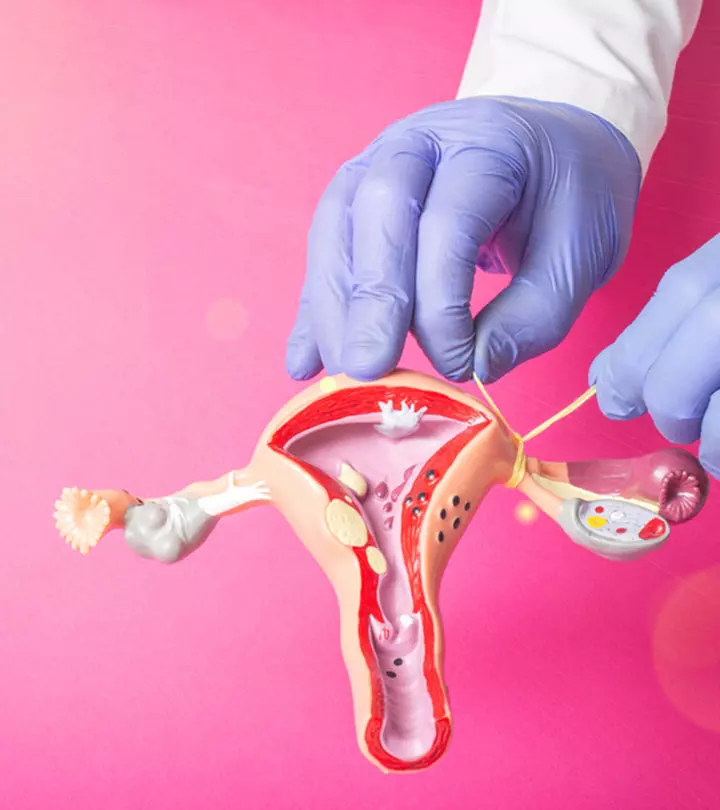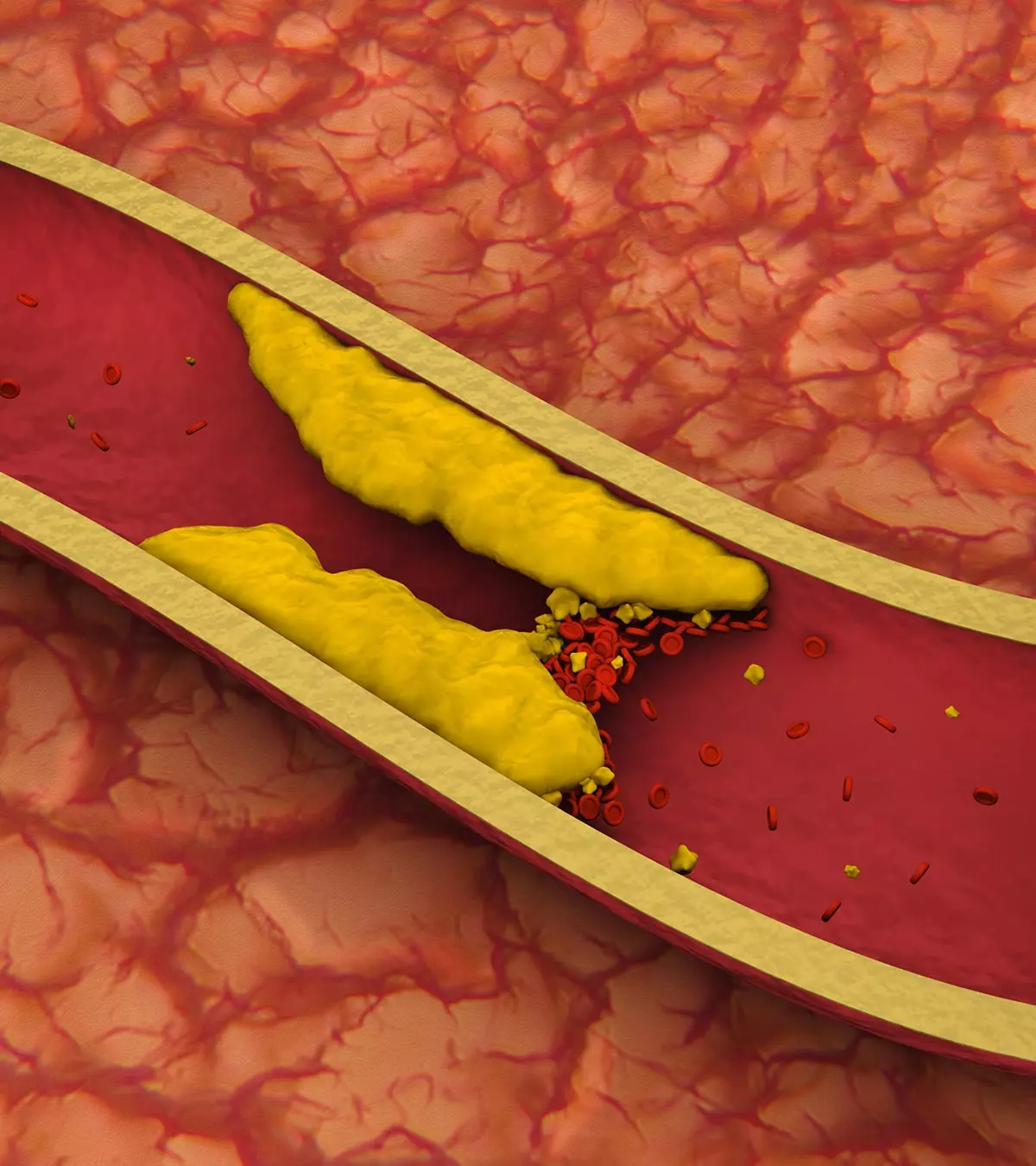
Image: ShutterStock
Most women would agree that there are numerous transformations in one’s body after delivering a baby. Vision changes after pregnancy could also be added to this list. Due to a myriad of bodily changes a woman experiences during and after pregnancy, some physical changes occurring in the internal systems could lead to changes in the vision of a new mother. In addition, there may be a little discomfort for women who face vision dizziness, which may impact their usual routines. Understanding these changes, identifying their causes, and finding the right solutions can help manage postpartum vision health effectively. Keep reading this post as we tell you about some possible reasons, signs, and management of vision abnormalities in women post-delivery (1).

Key Pointers
- Post-pregnancy, women may experience vision alterations caused by numerous hormonal changes.
- Various reasons, including elevated blood pressure and gestational diabetes, trigger vision changes following pregnancy.
- Sensitivity to light, temporary loss of vision, and dizziness can all be symptoms of vision changes.
- Treatment options include using saline solution and attending to underlying health problems.
Causes Of Vision Changes After Pregnancy
Obstetrician and gynecologist Dr. Veena Madhankumar says, “Physical and hormonal changes during pregnancy often cause most vision changes. These changes are usually minor, temporary, and tend to resolve independently.”
Due to the hormonal changes in the internal system, the mother may experience problems of blurry vision or dizziness. Some of the causes of the vision change may include:
1. Blurred vision

After childbirth, the fluid retention capacity of the eye ducts are extremely hampered. As a result, the cornea cannot sustain its normal shape, and the vision may get blurred or highly distorted.
Heather Darroch, a mother to a baby girl, discusses her pregnancy-induced shift from long-sightedness to short-sightedness, “Pre-pregnancy, I was long-sighted, so I could see far away and had really good vision. I got pregnant and started to notice some changes in my vision. I booked the eye test and found out that I had a myopic shift. The doctor said it’s probably due to the pregnancy hormones. I had Rosy (her daughter) and breastfed for almost a year and noticed that my eyes weren’t getting any better. I had been getting a lot more migraines. I went for an eye test and got to know that my right eye has become more short-sighted than my left eye, so I think they are about the same, but my right eye deteriorated; so actually, pregnancy has completely changed my eyesight (i).”
Corneal edema is another condition that may affect normal vision. The cornea thickens as a result of corneal edema, and this thickening can cause changes in the curvature of the cornea, which tends to peak in late pregnancy but typically resolves after childbirth and cessation of breastfeeding. The swelling associated with corneal edema can affect the thickness and refractive index of the cornea, leading to changes in how light is focused on the retina, ultimately influencing vision (2).
2. Preeclampsia
Women with high blood pressure issues experience preeclampsia in pregnancy. This condition can lead to vision problems, including light sensitivity, blurry vision, and, in some cases, retinal detachment during or after pregnancy.
According to the American Academy of Ophthalmology (AAO), the prevalence of vision complications in women with preeclampsia is around 25-33% (3). A study published in the journal of Obstetrics & Gynaecology highlights that “Preeclampsia, particularly severe or early-onset preeclampsia, is associated with an increased risk of maternal retinal disease in the decades after pregnancy” (4). Therefore, it is highly recommended to consult your gynecologist and take the requisite medications for effective treatment.
 Quick fact
Quick factAccording to Dr. Rohit Adyanthaya, MD, Assistant Professor of Ophthalmology, Eastern Virginia Medical School, Norfolk, “Patients who develop preeclampsia and eclampsia can have decreased vision from damage to the blood vessels in the retina. The most common retinal exam finding in this condition is constriction or spasm of retinal vessels, but there could also be hemorrhagesiHeavy discharge of blood from blood vessels and swelling of the retina, which can lead to decrease in vision. The retinal swelling can sometimes be very severe, to cause exudative retinal detachmentiCondition caused by fluid build-up behind the retina , which can cause significant loss of vision.
Rarely increased blood pressure can damage the part of the brain (occipital cortex), which is responsible for vision, and this is called cortical blindness.”
3. Gestational diabetes
Blood sugar levels may fluctuate during and after the pregnancy phase. Overt diabetesiWhen women without diabetes exhibit elevated blood sugar content and meet all the criteria for diabetes in the first antenatal visit (preexisting diabetes) is more dangerous than gestational diabetesiA temporary condition in which a woman is diagnosed with diabetes for the first time during pregnancy mellitus for eye health. Such changes in blood sugar level may damage the small blood vessels attached to the eye retina. A temporary form of diabetes known as gestational diabetes occurs in this phase of gestation, and this can often hamper eyesight, and the mother may have blurry vision (5). According to the US Centers for Disease Control and Prevention ( US CDC), gestational diabetes affects about two to 10% of pregnancies in the US, each year. Pregnancy-induced diabetes may also increase the risk for dry eye syndrome (6).
Dr. Adyanthaya adds, “Pregnancy can worsen diabetic retinopathy, wherein there is leakage of blood from the retinal blood vessels due to diabetes. This can cause significant vision loss if not treated promptly.”
4. Pregnancy-induced hypertension (PIH)

Pregnancy-induced hypertension (PIH) is a condition where the pregnant woman may develop high blood pressure after 20 weeks of gestation. PIH consists of gestational hypertension, preeclampsia, eclampsia, and HELLP syndrome wherein ocular manifestations usually occur (7). It can often lead to abnormal vision changes with its occurrence varying from 30-100% (8).
5. Obstructive sleep apnea (OSA)
OSA is characterized by pauses in breathing during sleep due to the temporary collapse of the upper airway (9). In the postpartum period, hormonal fluctuations and weight changes may increase the risk of developing OSA. When OSA occurs, it can lead to decreased oxygen levels in the body, affecting various organs, including the eyes. The eyes rely on a consistent oxygen supply for optimal function, and reduced oxygen levels may impact the delicate structures involved in vision (10).
6. Pituitary adenoma
Mothers rarely encounter the problem of Pituitary adenoma. But in some rare cases, a tumor growth occurs in the pituitary gland of the women’s body. They inhibit the normal functioning of the hormonal secretion within the body, which can further lead to vision problems after pregnancy.
 Experts say
Experts saySymptoms Of Vision Changes After Pregnancy
Some of the common symptoms of postpartum eye problems, normally experienced may include (11):
- Dizziness
- Double vision
- Light sensitivity
- Eye strain and headaches or migraines
- Intermittent blur
- Appearance of flashing lights
- Increased glare or difficulty focusing
- Temporary loss of vision
Monitor vision changes and track symptoms to share with your healthcare provider to manage vision-related issues better. While these symptoms often self-resolve during the postpartum period, seek prompt medical attention if any of these symptoms persist or worsen. Seek immediate medical care if you experience any of the following signs and symptoms (11):
- Double vision
- Appearance of flashing lights
- Temporary vision loss
- Bright spots
- Blurry vision
- Blind spots
- Bad headache with vision change
Treatment Of Vision Problems Experienced After Pregnancy
Vision changes encountered after childbirth usually persist for six-eight months. During the pregnancy phase, contact lens users are often recommended to switch to normal glasses for their pregnancy phase. Some of the treatment or curative measures to cure vision problems after pregnancy may include:
1. Treatment of dry eyes

The problem of dry eyes can be treated by utilizing the saline solution normally used by contact lens users. You can also contact an experienced ophthalmologist, who can prescribe effective eye drops or artificial tears to cure the vision problems (12).
2. Treatment Of Blurred Vision
If the condition of blurred vision persists for more than ten months after the childbirth, you can consult the ophthalmologist. He can further recommend LASIK laser eye surgery or new contact lenses for your eyes.
 Quick tip
Quick tip3. Treatment Of Preeclampsia
Problems of preeclampsia can be effectively treated by taking prescribed medications like oral antihypertensive (nicardia, labetalol)(13) and timely delivery.
4. Treatment of gestational diabetes

By regular exercising and eating a well-balanced diet (medical nutrition therapy), gestational diabetes can be effectively treated.
All these effective treatments and prescribed medications can help mothers to get rid of their vision problems after pregnancy. Even if the mother is not experiencing any vision problems, it is recommended that they should schedule the ocular examination about two months after childbirth to ensure their eye health (14).
Lifestyle Changes That May Improve Eye Health After Pregnancy
Many women experience changes in their overall health, including vision, after pregnancy. However, several lifestyle changes can help manage and improve eye health postpartum.
- Consume a nutritious diet rich in foods containing ample amounts of vitamin A, vitamin C, and Omega-3 fatty acids
- Stay adequately hydrated
- Get enough sleep
- Limit screen time
- Wear sunglasses with UV protection
- Manage stress through yoga or gentle exercises
- Quit smoking and limit caffeine
In addition to these, do gentle eye exercises like eye rolling, palming, and focus-shifting exercises to reduce strain and maintain eye flexibility. Go for regular eye checkups and consider supplements if your healthcare provider approves them.
Frequently Asked Questions
1. How long after pregnancy does vision return to normal?
Vision changes that occur during pregnancy usually resolve within a few weeks or months of childbirth (17).
2. Can pregnancy cause permanent vision changes?
Pregnancy-related vision changes are generally temporary and return to normal after delivery (3). However, consult your doctor in case of any discomfort and if the changes persist for longer than they should.
3. What are the long-term effects of vision changes during pregnancy?
Vision changes during pregnancy can often be temporary and have no lasting effects. However, it is critical to see an eye doctor for a thorough examination and to rule out any underlying conditions (15). Underlying conditions, such as gestational diabetes and preeclampsia, can have long-term adverse effects if not managed properly.
4. How do hormones affect vision changes during pregnancy?
Hormonal changes during pregnancy cause fluid retention. The extra fluid causes several changes, such as decreased tear production, eye and cornea thickness changes, and increased pressure inside your eyes. It is these alterations that can affect vision during pregnancy (15).
5. How does pre-existing eye health affect vision changes during and after pregnancy?
Hormonal changes during pregnancy can cause blood pressure fluctuations and fluid shifts, adversely affecting pre-existing eye health issues or diseases. It is vital to consult with an eye care specialist to determine any potential impact and receive necessary treatment (18).
6. Is vision change during pregnancy more common in some women than others?
Vision changes during pregnancy vary from one woman to another, and some women may be more prone to experiencing them than others. Generally, vision changes during pregnancy affect only about 15% of pregnant women. If they do happen, they are usually harmless. It is essential to visit an eye care specialist to rule out any underlying medical conditions (18).
Vision changes after pregnancy can be infuriating. You may need to squeeze your eyes and strain them to read the fine prints you used to understand earlier. However, this is not a rare postpartum change. It is common among new mothers and can be controlled with suitable measures. But if you are experiencing dizziness accompanied by blurred vision, you must consult an optometry specialist for immediate professional care. The health of your eyes should be your top priority as it supports you till the very end. Lastly, try consuming green leafy vegetables that may improve your vision.
Infographic: Causes Of Vision Changes After Pregnancy
During pregnancy, several changes happen inside your body. Some might lead to problems visible after the baby’s birth, one of them being the onset of vision changes. So, what are the common causes that lead to this condition? In the following infographic, you will find the answer to that question. Read on!
Some thing wrong with infographic shortcode. please verify shortcode syntax
Illustration: Most Common Reasons For Vision Changes After Pregnancy

Image: Stable Diffusion/MomJunction Design Team
Discover how pregnancy can affect your vision as this video sheds light on this topic. Receive expert tips on safeguarding and maintaining healthy eyesight throughout this remarkable period.
Personal Experience: Source
MomJunction articles include first-hand experiences to provide you with better insights through real-life narratives. Here are the sources of personal accounts referenced in this article.
i. How pregnancy has changed my eyesight | Myopic Shift.https://www.youtube.com/watch?v=7LaUxYaZW30
References
- Robert B Dinn et al.; (2003); Ocular changes in pregnancy.
https://pubmed.ncbi.nlm.nih.gov/12555046/ - Nursal Melda Yenerel and Raciha Beril Küçümen; (2015); Pregnancy and the Eye.
https://www.ncbi.nlm.nih.gov/pmc/articles/PMC5082244/ - Ocular Changes in Pregnancy.
https://www.aao.org/eyenet/article/ocular-changes-in-pregnancy - Preeclampsia, years later, still takes toll on women’s eyes.
https://www.aoa.org/news/clinical-eye-care/diseases-and-conditions/preeclampsia-years-later-still-takes-toll?sso=y - Gestational diabetes.
https://medlineplus.gov/ency/article/000896.htm - National Vital Statistics Reports.
https://www.cdc.gov/nchs/data/nvsr/nvsr71/nvsr71-03.pdf - High Blood Pressure (Hypertension) During Pregnancy.
https://my.clevelandclinic.org/health/diseases/4497-gestational-hypertension - Study of fundus findings in pregnancy induced hypertension.
https://www.ijooo.org/html-article/10369 - Linda M. Street et al.; (2018); Gestational Obstructive Sleep Apnea: Biomarker Screening Models and Lack of Postpartum Resolution.
https://www.ncbi.nlm.nih.gov/pmc/articles/PMC5886432/ - Matthew Santos and R. Jeffrey Hofmann; (2017); Ocular Manifestations of Obstructive Sleep Apnea.
https://www.cdc.gov/hearher/maternal-warning-signs/index.html - Signs and Symptoms of Urgent Maternal Warnings Signs.
https://www.ncbi.nlm.nih.gov/pmc/articles/PMC5656484/ - Blurry Vision While Pregnant.
https://my.clevelandclinic.org/health/symptoms/23114-blurry-vision-pregnancy - Thomas Easterling et al.; (2019); Oral antihypertensive regimens (nifedipine retard, labetalol, and methyldopa) for management of severe hypertension in pregnancy: an open-label, randomised controlled trial.
https://www.thelancet.com/journals/lancet/article/PIIS0140-6736(19)31282-6/fulltext - Postpartum eye health – Advice for expectant Moms.
https://www.weliahealth.org/2019/09/postpartum-eye-health-advice-for-expectant-moms/ - Khawla Abu Samra; (2013); The eye and visual system in the preeclampsia/eclampsia syndrome: What to expect?
https://www.ncbi.nlm.nih.gov/pmc/articles/PMC3729391/ - A Luger et al.; (2025); ESE Clinical Practice Guideline on functioning and nonfunctioning pituitary adenomas in pregnancy.
https://academic.oup.com/ejendo - Can pregnancy affect vision?
https://www.optometrists.org/general-practice-optometry/guide-to-eye-health/can-pregnancy-affect-vision/ - Mackensen Friederike et al.; (2014); Ocular changes during pregnancy.
https://www.ncbi.nlm.nih.gov/pmc/articles/PMC4165189/
Community Experiences
Join the conversation and become a part of our nurturing community! Share your stories, experiences, and insights to connect with fellow parents.
Read full bio of Subhashis Samajder
- Dr. Rohit Adyanthaya is a board-certified ophthalmologist and practices at Virginia Eye Consultants in Norfolk, Virginia. He holds a Retina fellowship from Valley Retina Institute, Texas, an additional fellowship from Wilmer Eye Institute (Johns Hopkins University), Baltimore, and an Opthalmology residency from the State University of New York. He specializes in diabetic eye care, retina, and urgents, and has more than 21 years of experience.
 Dr. Rohit Adyanthaya is a board-certified ophthalmologist and practices at Virginia Eye Consultants in Norfolk, Virginia. He holds a Retina fellowship from Valley Retina Institute, Texas, an additional fellowship from Wilmer Eye Institute (Johns Hopkins University), Baltimore, and an Opthalmology residency from the State University of New York. He specializes in diabetic eye care, retina, and urgents, and has more than 21 years of experience.
Dr. Rohit Adyanthaya is a board-certified ophthalmologist and practices at Virginia Eye Consultants in Norfolk, Virginia. He holds a Retina fellowship from Valley Retina Institute, Texas, an additional fellowship from Wilmer Eye Institute (Johns Hopkins University), Baltimore, and an Opthalmology residency from the State University of New York. He specializes in diabetic eye care, retina, and urgents, and has more than 21 years of experience. 
Dr. Veena Madhankumar is an experienced obstetrician and gynecologist with 25 years of clinical expertise. She completed her MBBS from Coimbatore Medical College, India, in 1999 and pursued her MD in Obstetrics and Gynecology from Sri Ramachandra Medical College, Chennai, India. Dr. Madhankumar has been associated with iCliniq for over a decade, providing expert medical consultations and guidance. She has also established a practical laparoscopy training course.
Dr. Veena Madhankumar is an experienced obstetrician and gynecologist with 25 years of clinical expertise. She completed her MBBS from Coimbatore Medical College, India, in 1999 and pursued her MD in Obstetrics and Gynecology from Sri Ramachandra Medical College, Chennai, India. Dr. Madhankumar has been associated with iCliniq for over a decade, providing expert medical consultations and guidance. She has also established a practical laparoscopy training course.
Read full bio of shreeja pillai
Read full bio of Rebecca Malachi
Read full bio of Aneesha Amonz
















